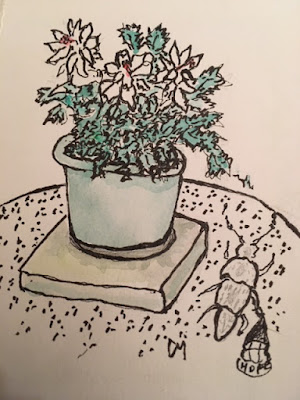I hesitated before pulling in beside the taxi that was parked in front
of my bank. From the passenger door a long leg had appeared. Stockinged foot,
sock rumpled and unclean. Behind that, a torso slumped over against the dash.
The taxi driver ran around to the front of my car and signalled for me to stop.
After he retrieved a blue clog from the sidewalk, he waved me forward as he
tried to fit the clog on that extended foot.
When I opened my car door, I heard a low growl and saw the owner of the
leg. Long grey hair. A flowing beard. As the man stood up, the driver put an
arm on his shoulder. “Are you sure you don’t want a ride downtown?” The man
uttered a guttural shriek.
I asked the driver, “Do you need help?” He shook his head. ‘No…at least,
I don’t think so.”
When I returned to the car, I could hear the man still shrieking. The taxi
driver, now placing himself between the man and me, said, “This lady needs to
get into her car.” As I passed by, I
heard the taxi driver say, “Now you keep that money safe. Put it out of sight.”
The driver took off hurriedly and the man walked over to my car and began
to pound against the door and thump on the roof. He leaned toward my window and
stared at me, howling. His expression was furious, beseeching, incomprehensible.
His blue eyes were intense, penetrating. I remained motionless as the hammering
on the roof continued, along with the snarls and moans. It was an inhuman sound,
unlike any I’ve ever heard. The closest I’ve experienced are the screeches from
the herons’ nests when the eagles swoop in and capture their chicks.
People walked along the sidewalk in front of me. They went in and out of
the bank. Most of them stopped for a moment to stare at the roaring man but no
one offered assistance. I thought back on times when community members have
been moved to help each other. In the last few snowstorms, neighbours came to
my door and brought soup. They offered to shovel my driveway. In certain circumstances,
people have been moved to step up and offer help. And they felt better for it.
But not in this kind of situation.
The man continued to circle my car, again and again, peering in at me, making
that unearthly sound, hammering the roof. He was angry. Afraid. Terrifying. I didn’t
think it would help if I got out of the car and tried to talk to him. I
considered calling for help but was afraid to open the window. I could have
phoned 911, but what good would that have done? Finally, I leaned on the horn until
the man staggered off, still howling.
After several minutes, I drove to the shopping mall. Surprised to find
myself still trembling, I stayed in the car and wondered what I might have done
differently. Not far away was the location of the tent city where three hundred
people lived until temporary housing was constructed and the tent city was
dismantled. The temporary housing accommodated 168 people, and I seem to
remember that there was an application process in which the most motivated
people with less critical problems were given preference for relocation. Where have
the others gone? The ones who whose
psychiatric illnesses were pronounced or whose substance abuse was extreme?
Last year, I was one of the people who wrote letters in support of providing
temporary housing for homeless people. I helped with welcome packages for the
new residents, and had little sympathy for the neighbours of the shelters who
complained that they were now afraid to leave their homes. Not surprisingly,
there were some incidents when people moved into the shelter. An eight-foot
wall was constructed around the compound and periodically people wrote abusive messages
on it.
Several decades ago, I was a social worker on the psychiatric ward of
our regional hospital. We set up a halfway house for individuals with
psychiatric problems. Now there are a number of halfway houses but they are
full with waiting lists and they are not designed to provide emergency
responses for the growing number of homeless people who, despite psychiatric
and substance use problems, are not connected to medical services.
Back when the food banks first began in our community, we social workers
spoke out about the need for these services to be offered on a very short-term
basis only as crisis interventions. We believed governments and communities could
tackle the problems of poverty and homelessness, and that we would not continue
to require such patchwork solutions. Now, all across our country, there are
local, regional and national associations of food banks that are doing
crucially important work to meet an ever-increasing demand. Our local food bank
now has hired a Director of Development in order to help find ways of
responding to the increasing need.
Some people have suggested that provincial institutions should be set up
to incarcerate people with extreme psychiatric and addiction problems, but that
only shifts the problem. As a community we need to find ways of supporting
people who live amongst us.
At the grocery store, I added extra money on my tab to support the food
bank. Then I stopped by the Salvation Army person who was collecting money in
front of the liquor store and gave her all my change.
I thought about fingers and dykes. Walls and borders. The passing of
bucks. Complexity, and an impossibly divided and broken world. About the new
year ahead.


